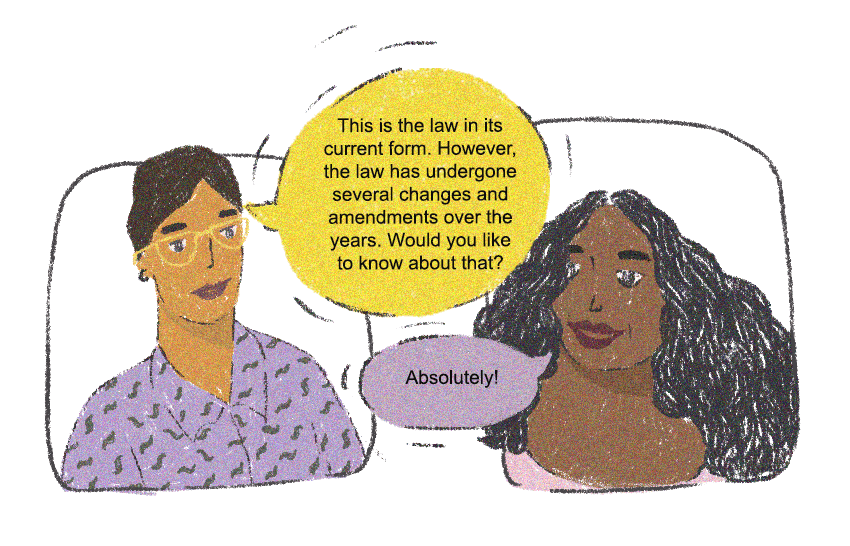
In India, abortions or ‘medical termination of pregnancy’ was legalised in 1971 through the Medical Termination of Pregnancy Act.
In its current form, the law on abortion lists who can access the service, who can provide the service, the time restrictions and also circumstances and conditions under which an abortion can be availed:
Any abortion procedure has to be conducted by a qualified and trained allopathic medical practitioner. In addition, the pills can only be prescribed by a medical practitioner. The practitioner has to have a qualification recognized by the Indian Medical Council Act and needs to have their name in the State Medical register. Naturally, the practitioner must have the required training and experience in gynaecology and obstetrics as specified in the MTP Act. Any abortion carried out by an unqualified medical practitioner is considered to be an offence under the IPC. This is punishable by a sentence of 2 to 7 years.
The MTP Act allows pregnancies up to 24 weeks of gestation to be terminated; any pregnancy that exceeds 20 weeks will require the approval of two medical practitioners. In cases of substantial foetal abnormality, a pregnancy may also be terminated beyond 24 weeks of gestation but a medical board will step in to regulate the process.
A pregnancy can be terminated in any hospital established or maintained by the government or in a place which has been approved by the government for the purpose of the procedure. The establishment should have a notice featuring in a visible place that it is a medically certified centre for medical termination of pregnancy.
There are innumerous reasons that a pregnancy can turn unwanted but the MTP Act’s gambit provides certain conditions and it is only under these conditions that a pregnancy can be terminated.
- The termination can be sought on the grounds that the pregnancy causes harm to the physical health or the mental health of the pregnant person either in the current scenario or in the foreseeable future.
- An abortion is also allowed on eugenic grounds if it is revealed at any stage that the child, if permitted to be born, would be at substantial risk of experiencing disabilities or other medical conditions.
- The Act also allows abortion if the pregnancy was a result of rape, a sex crime or in case abortion is being sought by a person with a mental disability.
- In the case of contraceptive failure for a woman and her partner.
If the pregnant person is a minor i.e. below the age of 18, or a person with a mental disability, the written consent of their guardian or parent is required.
If the pregnant person is an adult, only their own permission and consent is required.

Abortions have been taking place in India long before the 1971 legislation was introduced. In fact, the Indian Penal Code (IPC) 1862, which has its roots in the British Act called Offences Against the Person Act of 1861, criminalised abortion. The MTP Act was introduced in 1971 and has now undergone three amendments. Click on the tabs to find out more!
The Indian Penal Code 1862, which has its roots in the British Offences Against the Persons Act of 1861, criminalised abortion. Any form of induced miscarriage, unless done to save the pregnant person’s life was considered a serious offence and was punishable.
The MTP Act was passed by Parliament in 1971 and it legalised abortions in all states except Jammu and Kashmir. The Act was considered to be pretty liberal considering that it was passed in the 70s. It was hailed as a major milestone in social legislation in the country.
Amendment 2002: The amendment decentralised the process through which private abortion facilities received approval. This was aimed at increasing the number of centres that provided the services. The amendment also replaced the word ‘lunatic’ with ‘mentally ill’.
The Bill intended to expand the provider base to include medical practitioners with bachelor’s degrees in Ayurveda, Siddha or Homeopathy. Nurses, with a three-and-a-half-year degree and registered with the nursing Council of India were also recommended to be included as legal providers. The Bill also recommended that the permitted gestation limit be increased beyond 20 weeks.
The amendment added the definition of ‘termination of pregnancy’ as a procedure undertaken to terminate pregnancy either surgically or medically. The earlier Act allowed abortion as a recourse only for ‘married women and their husbands’ in the event of contraception failure. The amendment changed it to ‘woman and her partner’.
